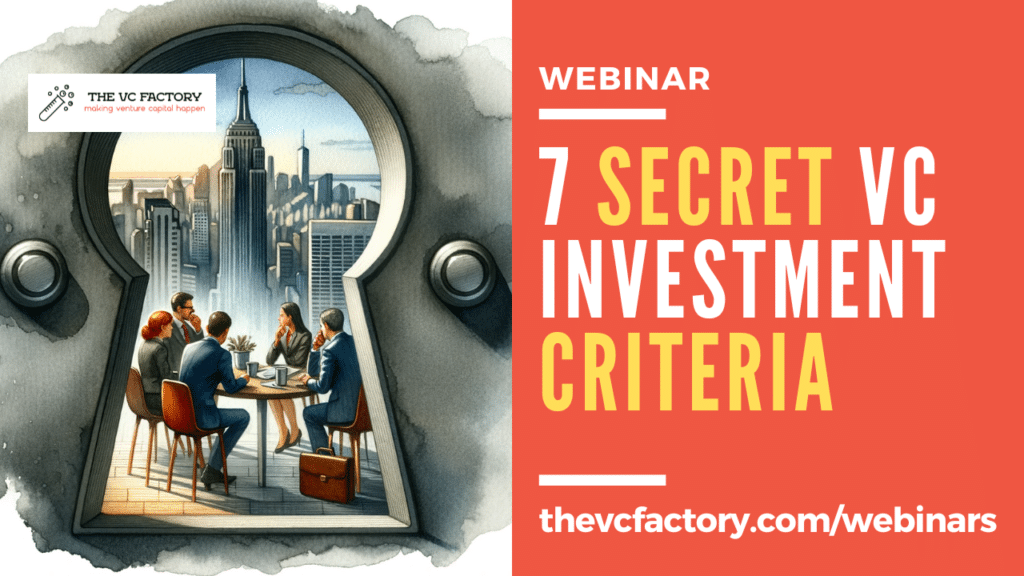The 7 Secret Evaluation Criteria Venture Capitalists Use To Make Investment Decisions
- 9.5K views
- 18 minute read

Venture Capitalists are vocal about what they look for in startups they invest in: stellar team, large market, scalability, exit routes, etc. What about the evaluation criteria they don’t discuss but critically influence their decision-making process? Behind-the-door dynamics and subconscious cognitive biases built on intuitions going wrong often push Venture Capitalists to invest or pass on investment opportunities.
In this post and the companion webinar, I uncover seven untold criteria Investors use to evaluate startups, including cognitive biases on the Founders & their ideas, typical blind spots VCs fall prey to, and internal dynamics within the VC firm.
In This Article
Accelerate Your Learning: Watch Our Webinar!
Don’t just read about it, immerse yourself in the content through our companion webinar for this post! Engage with a multimedia presentation, discover all the referenced sources, and have your questions answered live! Click the “Watch Now” button to access the webinar. (Members: click here).

Explicit criteria Venture Capitalists talk about
In recent years, VCs have become more vocal about their criteria for making investment decisions. Most fundraising Founders know that Investors look for effective teams first, a large market second, and then a mix of a scalable business model, visible exit route, barriers to entry, momentum, and more.
The Gompers et al. (2020) study presented in the webinar, which surveyed over 800 VCs, ranked these criteria:
- Team
- Fit with the fund
- Product
- Business model
- Market
- Industry
- Ability to add value
- Valuation
Some of these criteria would benefit from more granularity, such as the evaluation of Founders, their fit with the startup they created, and the mission they push forward. However, these explicit criteria are well understood. I addressed them in detail in the article below.
While they are helpful in screening deal flow, these evaluation criteria don't fully explain how VCs decide where to invest.
Why Explicit Criteria Are Not Enough
Venture Capital is quite unique in that Investors need to make decisions based on very little data. Nigel Morris, who co-founded Capital One—one of the biggest successes in the financial sector in the early part of this century—once said that he found it easier to be the CEO of a public company than an Investor in startups. Now at the helm of QED Investors, a fintech-focused VC firm, he tries to find gems that were founded only a few months before.
Venture Capital is about extracting enormous signal out of very little data.
Nigel Morris (source: 20VC)
The signals Morris refers to can be as subtle as the way Founders react to due diligence requests, or how they conduct themselves in a management meeting. I commonly remind fundraising Founders that Venture Capitalists are really good at two things: understanding business models and reading team dynamics.
The information asymmetry is so dominant in Venture Capital—Founders know more than Investors about their team, product, and market—that every tiny bit of information is integrated into VCs' evaluation of the investment opportunity.
The problem in exploiting these signals is the level of subjectivity involved. The Investor's personality, past experience, and even mood of the day influence how he or she reacts to a business proposition. Here lie some of the most damaging sources of mistakes VCs make.
More on it later. Let's start with more factual secret criteria, before moving to the more subconscious ones.
#1. Not Moving The Needle
One of the most influential criteria VCs use to make investment decisions concerns potential returns. VCs rarely mention it directly, as it may hurt Founders' feelings to hear that their startup will not generate substantial financial performance. Instead, VCs use phrases such as "Your business plan is not aggressive enough" or "You're not asking for enough money" to convey this idea.
The core concept at work is the power law in VC returns. Data shows that a small number of investments generate the majority of financial gains for a portfolio. In practice, this means that while most startups in a VC's portfolio may either fail or yield modest returns, a singular successful investment can produce returns that are large enough to compensate for all other losses and still deliver a substantial net gain.
This disproportionate return distribution dictates that Venture Capitalists actively seek these rare but exceptional opportunities that have the potential to return the value of the entire fund or more, underscoring the high-risk, high-reward nature of Venture Capital investing. Read the article below for a deep dive into the VC power law.
In VC lingo, an investment that does not return enough does not "move the needle" for the firm making the investment. Investors often pass on an investment opportunity that looks enticing but fails to reach the desired returns even in the best-case scenario. I illustrate this point with concrete examples in the webinar.
VC firms play a portfolio strategy with a fail-fast approach that allows them to focus their resources on potential winners. Founders, on the other hand, have all their eggs in the same basket. Go big or go home applies on both sides of the checkbook, but not with the same consequences.
#2. Internal standing
Another decision criterion that escapes Founders who are denied funding is that the VC partner they deal with is not influential enough to win his or her partners' vote.
Most entrepreneurs fail to realize that investment decisions in VC firms are often highly collegial. When they pitch VCs, Founders need not only convince the partner sitting at the other side of the table. They also have to give them tools to sway their colleagues during the Monday morning reporting meeting and—if the opportunity advances sufficiently through the deal flow funnel—at the investment committee. It is best done with data and a compelling story, which is easy to remember and tell others.
VC firms' investment committees (IC) are the forum where opportunities are discussed and given a go/no-go to proceed to the term sheet phase. Voting rules considerably influence how IC decisions are made—a research topic I detail in the article below.
In most firms, some partners weigh more in the investment decision than others. The extra influence is often based on seniority, but recent successes naturally play a role. A Midas List Investor will attract more LPs at the next fund's road show, possibly becoming a key (wo)man whose presence decides the fate of the fund.
Internal standing, i.e., how good the recent track record is, plays a significant role in the final investment decisions. The former head of one of the most elite VC firms in the world, Sequoia Capital, recently took this point home.
I got a blazing start. But it gave me a false sense of confidence. I went through the abyss and came on the other side.
Doug Leone - Sequoia (source: 20VC)
Reminiscing about his early years at Sequoia, Doug Leone talks about his first seven investments being roaring successes. After betting on three startups that went public, he committed money to four more that all got acquired. The resulting false sense of confidence led him to believe he called the next tech wave right. The 2001 Internet Bubble crash was sobering, and he probably stayed on—eventually becoming the firm's co-managing partner—only due to Sequoia's culture of long-term relationships.
VC partners who are "in the abyss", as Leone calls it, are less likely to take risks and potentially further fragilize their situation. They may pass on investment opportunities that they would take if they had a better internal standing.
VCs who hit a winning streak have more influence in the firm. It helps them achieve their goals more often than others.
#3. Founder-Related Biases
We now enter the realm of cognitive biases, conscious or otherwise, that influence Venture Capitalists' decision-making.
If you're familiar with my blog posts, you already know that I often try to leverage prominent theories in psychology to understand why Investors behave in a certain way. I mobilize learnings from an ongoing Doctorate in Business Administration and other academic research endeavors and pair them with observations gathered through 15+ years of investing and advising work.
Legendary VCs seem to agree about the significant of psychology in VC investment decisions. In the webinar, I show one of my favorite Guy Kawasaki videos. He compares Venture Capital to the dating app "Hot or Not" (a predecessor to Tinder), explaining how VCs make decisions about Founders in less than 15 seconds—based on what entrepreneurs look like or their accent, but also the Investor's mood of the day.
I believe Venture Capital is like Hot-or-Not. It is a dating game.
Guy Kawasaki (Source: Youtube)
Guy Kawasaki's observation meets what Nobel-prize laureate Daniel Kahneman and his colleague Amos Tversky, who decrypted what happens in our brains when we make judgments under uncertainty, named representativeness half a century ago.
Representativeness is a cognitive bias where people assess the probability of an event by comparing it to an existing prototype in their minds. This mental shortcut often overlooks actual statistical probability. While this can enable quick decisions, it often skews reasoning, leading to overgeneralization and potentially causing significant errors in judgment.
I believe that the lack of diversity in VC is due to this cognitive bias that is largely unconscious. I detailed my analysis in my article on VC diversity.
How Are Signals Interpreted To Inform VC's Evaluation Criteria?
Most professional Investors are trained to delay their intuition to gather more data before they make a rash decision and add one more name to their anti-portfolio—the list of opportunities they passed on that became huge successes.
Guy Kawasaki's former partner at Garage Ventures, Bill Reichert, lifted the veil on the VC data collection process, which he called the "dirty secret" of Venture Capital in a Stanford class over a decade ago. He explained that most of the time between a first meeting with Founders and closing the deal is spent gauging whether the entrepreneurs do what they say they do and evaluating their professional acumen. I drilled down into the Founder evaluation criteria in the article below.

I often illustrate this point with the story of an investment opportunity that arrived at me through my investment firm's CFO. His neighbor was raising funds for his company. It was in 2009 but what happened is engraved in my memory and a perfect illustration of how Investors try to reduce the information asymmetry I mentioned earlier, with varying degrees of success.
I wasn't too convinced about the company's business model, but I had time (the 2008 crisis significantly reduced deal flow) and took a train to go meet the Founders. They blew me away with how well they had prepared their pitch and how thoughtful and clear their vision was. That burgeoning feeling grew stronger after a long lunch with their management team, which seemed both competent and closely working together. I was in full data-gathering mode à la Bill Reichert.
But what convinced me to dig deeper was what they did next. As I left, they handed me a 30-page booklet. I realized they had painstakingly answered the fifty questions I had sent them ahead of our trip. They sent me a strong signal about how reliable and trustworthy they were. I'm still close with the Founder and some members of his team, who went on to form other successful ventures since.
#4. Being Primed
This one is perhaps one of the two most influential investment criteria in the list, along with criterion #5. Like everyone else, Investors are influenced by their past experiences. They are "primed" by their interactions with Founders and ideas, and associated successes and failures. Such priming impacts their decision-making process.
Evolutionary psychologists claim that the ability to remember an interaction and learn from it is the basis of humans' survival. Gad Saad, a well-known academic applying evolutionary psychology to marketing, recently wrote a peer-reviewed article listing the advantages of such "adaptive cognitive systems". Among others, they allowed humans to remember cheaters and avoid them in the future, but also recall which ones were the high-calorie foods or which fruits and plants to avoid.
Information is better recalled when it is associated with a survival scenario.
Gad SAAD (source: Journal of Business research, 2020)
How do such survival-based processes take us to VC decision-making? We need to take a detour through a model called (wait for it) the Recognition-Primed Decision Model of Rapid Decision-Making. It was thankfully abbreviated to RPD. Developed by the famed psychologist Gary Klein, the RPD tries to explain how experts mobilize their tacit knowledge to make decisions under conditions of uncertainty and time pressure.
In the late 1980s, Klein and colleagues observed how commanders of firefighting brigades were able to tap their past experience to make an instant decision regarding the best course of action in a fire incident. The term they use to identify such experience is telling: a "repertoire of patterns".
Patterns are what Venture Capitalists love above all else. Often on the brink of drowning under the wave of new investment opportunities presented to them, most VCs develop patterns regarding Founders, markets, and team dynamics, to help them sift through the pile of deal flow landing on their desks. Many Investors pride themselves on having identified such patterns to spot future unicorns. I treated the intuition vs. data paradigm in VC in the article below.
Investors are primed by prior interactions with an idea, a problem, a Founder, or a business model that looks like the one under consideration now. VCs tap into such tacit knowledge to make a judgment, under uncertainty and time pressure, on whether to dedicate more resources to the opportunity—or pass. As detailed in the webinar, there are four ways VCs are primed by prior interactions:
- They made an investment in a similar space or startup that was a) immensely successful or b) an embarrassing failure
- They didn't make such investments
The impact the anti-portfolio has on Investors is often underestimated. While many VCs publish theirs to brag about the quality of their deal flow, it stings to have missed a potential unicorn whose Founders they were the first to meet.
Given the power law distribution in VC returns, a botched opportunity may have dire consequences on the future of a VC firm's existence. Many Investors find themselves desperate not to miss the next opportunity that bears some kind of resemblance to a previous one they didn't invest in. They have been positively primed by a former interaction.
Venture Capital is a regret business.
Neil Shen - SEquoia Capital (Source: Financial times)
In the webinar, I mentioned first-hand accounts of a VC missing Airbnb and another one investing in Coinbase's seed round when everybody else said no. They are vivid illustrations of how prior interactions are mobilized by VCs—even though, as Gary Klein discovered, they can't often articulate it—to make investment decisions.
You've reached a Members-only area.
Unlock Full Access
Discover exclusive content curated for Venture Capital professionals and enthusiasts. Join our community and gain unlimited access to in-depth articles, expert guest interviews, MBA-level webinars, and networking opportunities.
Register for our 7-Day Free Trial: Click Here
Already a member? Please Log In Below:
Subscribe to our Newsletter
Join 12,000+ VCs & Founders globally who enjoy our weekly digest on Venture Capital. We keep your information confidential and you can unsubscribe at any time. Sweet!



